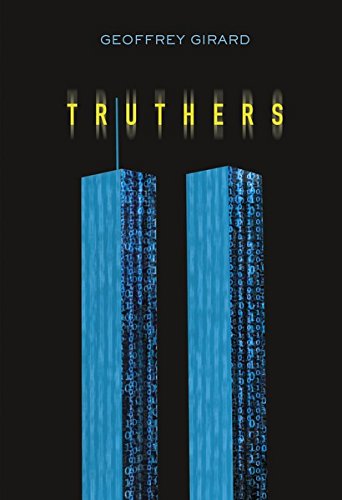About a month ago, I wrote about the book Truthers by Geoffrey Girard. Mr. Girard is the author of several books, and he currently chairs the English department at a private boys’ high school. He wrote this story to help his students critically analyze the conspiracy theories they were so fond of discussing, especially the idea that the government was somehow involved in the 9/11 terrorist tragedy in a way that hasn’t been revealed. In fact, the Google dictionary defines “truther” as “a person who doubts the generally accepted account of an event, believing that an official conspiracy exists to conceal the true explanation; a conspiracy theorist.” My original post was to notify you of the book’s existence and purpose; recently I’ve just finished reading it myself.
account of an event, believing that an official conspiracy exists to conceal the true explanation; a conspiracy theorist.” My original post was to notify you of the book’s existence and purpose; recently I’ve just finished reading it myself.
Mr. Girard does a commendable job of writing about a difficult subject — what other conclusions can be drawn other than those the mainstream evidence overwhelmingly supports? Personally I think the book is a bit overwritten with an almost constant analysis of the main character’s thoughts, and there were some extreme plot twists, but he succeeds in his goal of analyzing a conspiracy theory while suspensefully holding the reader’s attention.
In that analysis, he touches on a point I think needs elaborating — why do we tend to believe conspiracy theories in the first place?
Apparently I’m not the only one wondering. An article entitled “Why Smart People Still Believe Conspiracy Theories” by Jeffrey Kluger in Time’s November 19, 2017 news brief reports that such beliefs are common. Mr. Kluger quotes a 2015 analysis that found at least 20% of Americans still believe in a link between vaccines and autism, at least 37% think global warming is a hoax, 42% believe in ghosts and 41% in extrasensory perception. And those numbers have been stable over time.
The article also reports on a study published online in the journal Personality and Individual Differences that gives some insight into why so many of us believe in things that just aren’t true. I’ll skip the methodology and go straight to the bottom line: in some cases, we simply want to believe. It’s not enough to have the ability to think analytically, but the inclination to do so too.
In Truthers, Mr. Girard explains it more simply — the paranoid caveman was right just often enough to have the edge in passing on his genes, so there is skepticism in all of us.
To wade through the logic yourself, you can find Mr. Kluger’s article at http://time.com/5023383/conspiracy-theories-reasons-believe/? .
